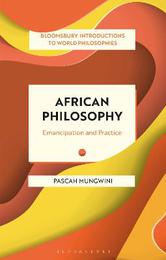
|
African Philosophy: Emancipation and Practice
Hardback
Main Details
Description
Caught between the history of exclusion and the reality of the world philosophies approach, this is an introduction to African philosophy unlike any other. With distinctive insight Pascah Mungwini brings together African philosophy and the emancipative mission, introducing African thought as a practice defined by its own history and priority questions while always in dialogue with the world. He charts the controversies and contestations around the contemporary practice of philosophy as an academic enterprise in Africa, examining some of philosophy's most serious mistakes, omissions, and failures. Covering the history of African philosophy's development and trajectory, Mungwini's introduction focuses on the struggle for intellectual liberation. His compelling portrayal reveals that true liberation begins by understanding one's own world, an essential point for anyone beginning to explore another philosophical tradition on its own terms.
Author Biography
Pascah Mungwini is Professor of Philosophy in the Department of Philosophy, Practical and Systematic Theology at the University of South Africa, South Africa.
ReviewsThe attainment of political independence in Africa was like grabbing a radiant crab apple from the tree. In this book Pascah Mungwini argues that African philosophy is the bearer of the emancipative mission for its authentic liberation extending beyond the borders of the continent. * Mogobe Ramose, Professor of Philosophy, Sefako Makgatho Health Sciences University, South Africa * This book is a welcome addition to African philosophy's quest to establish itself as a credible philosophical tradition. Mungwini's comprehensive approach is certainly going to illuminate some dark crevices in the history of African philosophy. * Bernard Matolino, Associate Professor of Philosophy, University of KwaZulu-Natal, South Africa * Mungwini provides a compelling and lucid account of contemporary African philosophy, highlighting the continuing struggles to overcome colonialist and racist structures and assumptions, and the myriad conversations it has and can have with other established and emerging world philosophies. * Bruce B. Janz, Professor of Philosophy, University of Central Florida, USA *
|